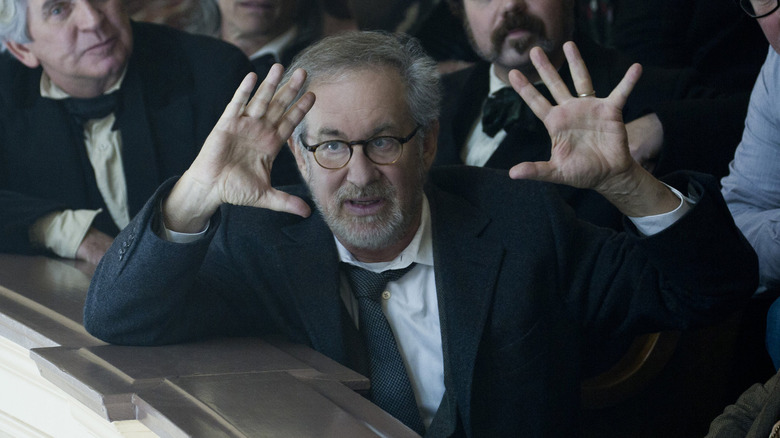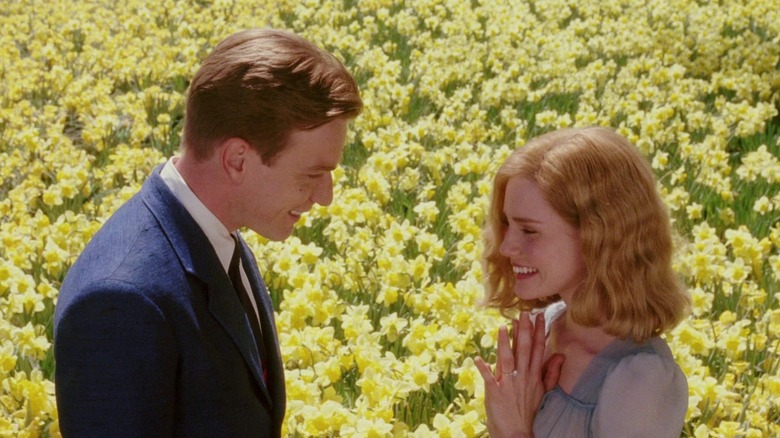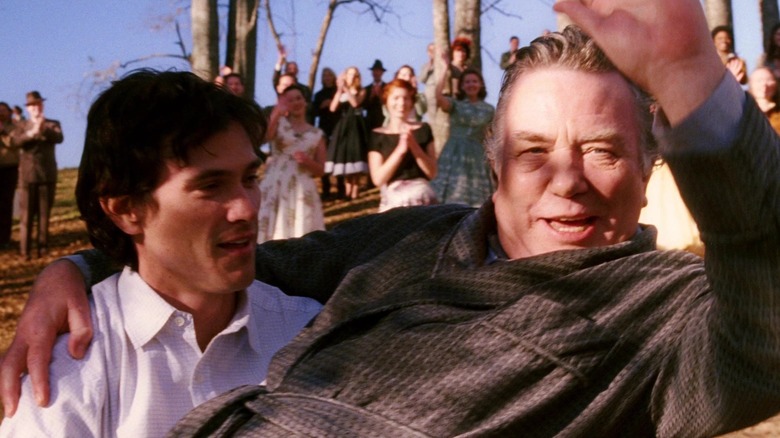Steven Spielberg Almost Directed This Classic Tim Burton Film
Steven Spielberg and Tim Burton existed on opposite ends of the filmmaking spectrum when the latter burst onto the scene in the 1980s. The former was no stranger to tales of terror in the suburbs, having been involved with "Poltergeist" and "Gremlins" by then. (Even "E.T." adapts the stylings of a horror flick in the scene where government agents in spacesuits invade the Taylor family's home in search of the titular alien.) However, the suburbs themselves were cozy and comforting in Spielberg's films; it was usually exterior forces that threatened their domesticity. Burton's movies, on the other hand, depicted the suburbs themselves as being unnerving and baffling. His sympathies laid with outsiders like Pee-wee Herman and Edward Scissorhands, who were content to lead their strange, loner existences until others insisted on intruding upon them.
Burton's adoration of death lay in equally stark contrast to Spielberg's sentiment, so much so that Burton deemed his '80s comedy classic "Beetlejuice" the antithesis of a Spielberg picture from that era. As far as their personal lives went, though, the two directors weren't so far apart at the time. Spielberg was infamously estranged from his father for years after he and Spielberg's mother got divorced, and he channeled that pain into his movies. When Spielberg and his father reconciled, that, too, manifested itself in the director's films, which became more sympathetic in their depiction of the difficulties of fatherhood (something you can trace back to 1989's "Indiana Jones and the Last Crusade"). By the end of the 1990s, Spielberg had even dedicated "Saving Private Ryan" to his father, himself a WWII veteran.
That being the case, you can see why Spielberg, at this point in his career, would've been interested in directing "Big Fish," itself a story about an estranged father and son that's equally sympathetic to both. He very nearly did, too, right up until he passed — clearing the way for Burton to helm one of the greatest films of his career.
Some of Spielberg's Big Fish made its way into Burton's version
An adaptation of Daniel Wallace's 1998 book "Big Fish: A Novel of Mythic Proportions," 2003's "Big Fish" marked a turning point for Burton in that it was the first film he'd made where his avatar wasn't an introvert and/or eccentric misunderstood by their parents or peers. Here, the patriarch is Edward Bloom (played by Ewan McGregor and Albert Finney at different stages in his life), a fella with a sociable manner who delights practically everyone he meets with wild stories about his youth and escapades as a traveling salesman ... everyone, that is, except for his jaded son Will (played by Billy Crudup as an adult), who has tired of hearing his father's tall tales over and over and yearns for him to speak the plain truth. (We can also intuit that Will's partiality towards facts over fiction may have largely been the impetus for the character becoming a journalist.)
According to "Burton on Burton" (itself edited by Mark Salisbury), "Big Fish" writer John August spent roughly a year putting together various versions of the script for Spielberg, who became attached to direct the film in 2000 after reading August's initial draft. Spielberg was never quite satisfied with the script, though, and while he originally planned to make "Big Fish" as his follow up to "Minority Report," he ultimately departed the project. August then proceeded to assemble his "Best Of" draft, which included certain elements from previous iterations while disposing of others. This also led to most of the script additions made at Spielberg's request being dropped, although some of them still made their way into the final film (in particular, a scene where creepy trees in a dark forest come alive and attack McGregor as the younger Edward Bloom — much as that might read like something Burton would've come up with).
Spielberg had also wanted Jack Nicholson to play the older Edward. Interestingly, when Burton replaced Spielberg as director, he similarly approached the Hollywood legend for the role before casting Finney, having previously collaborated with Nicholson on "Batman" and "Mars Attacks!" In fact, before that, Burton even toyed with the idea of digitally altering Nicholson so he could portray Edward when he was younger as well. "That was a funny discussion but it didn't really go anywhere," as Burton put it in "Burton on Burton." (Thank goodness for that; a digitally de-aged Nicholson circa 2003 would've been pure nightmare fuel, and not in a playful Burton-esque way.)
Burton connected with Big Fish personally
Much like Spielberg became alienated from his father at a relatively young age, Burton actually moved into his own apartment when he was only 15 years old and remained distant from his parents up until his father and mother died in October 2000 and March 2002, respectively. "I don't know if there's any real reason why I didn't get on with my parents," Burton confessed in "Burton on Burton." "It had more to do with the fact that when I was living there [with them], I felt old for my age." He added that he "didn't get along" with his mother and his father was "away a lot, and [he and my mother] were having whatever their problems were, and I was just always remote."
It's little wonder, then, that Burton found himself drawn to "Big Fish," which he became formally attached to direct just a month after his mother died. While Will has a mostly solid relationship with his mother Sandra (who's played by Jessica Lange in the film's present and Alison Lohman as a younger woman), she also tolerates and embraces Edward's quixotic stories for reasons that Will struggles to understand in the movie's early going. Meanwhile, Edward's job meant that he, like Burton's own father, was gone for prolonged periods of time while Will was growing up, which enhanced his mystique when Will was an impressionable boy but only added to the sense that Will didn't really know his dad as an adult.
As Burton noted in "Burton on Burton," directing "Big Fish" allowed him to go on a journey much like the one Will does in the movie when, while Will and his wife Joséphine (Marion Cotillard) are spending time with Edward and Sandra after Edward is diagnosed with terminal cancer, he sets out to uncover the truth behind his father's tales (which are shown in flashback, albeit in the way Edward recounted his experiences, fantastical elements and all). "I've had therapy but I've never discussed my parents. But in reading this script I thought, 'This is it exactly, this puts an image to the uncommunicable,'" Burton explained.
The result was not just one of Burton's most personal films, but also one of his most emotionally mature and a chance for him to marry his visual prowess with a layered narrative (which he did to terrific effect). As for Spielberg, he went off and directed his own outstanding picture about a person growing up and coming to see their parents as real, flawed human beings with "Catch Me If You Can." Indeed, for a moment, these two artists were aligned in their outlooks. Who would've thought it?


